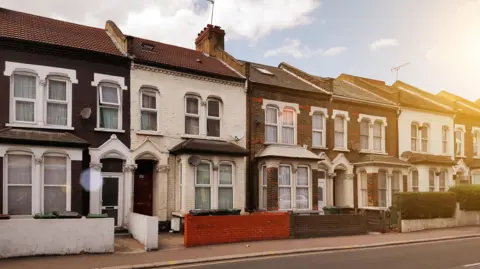Plans to change how council housing is allocated
 Getty Images
Getty ImagesCouncils in Lewes and Eastbourne are proposing a new approach to the way council homes are allocated to residents on waiting lists.
They are recommending moving away from the current bidding system to a new method that enables housing officers to match homes to the best-suited families and individuals on the register.
Figures show that in 2022/23 there were 529 households on the waiting list in Lewes and 179 properties available, while in Eastbourne there were 823 households and 181 properties.
Councillors in Lewes agreed to push ahead with the plans last week and launch a public consultation, with the same proposals to be discussed in Eastbourne later.
'Positive step forward'
Choice-based lettings (CBL) was introduced by the government in 2001 and councils were offered grant funding as an incentive to adopt the system.
The bidding process takes two weeks before applicants can be shortlisted.
The councils say, as demand has outstripped supply and many applicants spend years on the waiting list, the CBL model causes significant delays that can leave available properties empty for several weeks.
It has been estimated only 60% of those on the housing register bid for properties and applicants are not encouraged to broaden areas of choice to improve their chances of success.
Councillor Mark Slater, Lewes District Council cabinet member for tenants and those in housing needs, said while a new system would not solve the "deep rooted-issues" of the availability of social housing, it would be a "very positive step forward".
He added: "I see numerous advantages of Property Match over Choice Based Lettings, most notably the speed of the process, the greater clarity and transparency and much improved customer service."
If adopted, applicants would continue to be prioritised into bands A-C, with priority also based on their registration date, bedroom need, disabled adaptations and their preferred local area.
Plans include some adjustment to the bandings, introducing a maximum income threshold of £80,000 and a housing-related debt limit of £1,500 to qualify to join the housing register.
Applications would still be able to express a preference for where they would like to live, have the right to decline the first two offers made without any impact on their status on the register and continue to be able to challenge the reasonableness of offers they receive.
Follow BBC Sussex on Facebook, on X, and on Instagram. Send your story ideas to [email protected], or WhatsApp us on 08081 002250.
